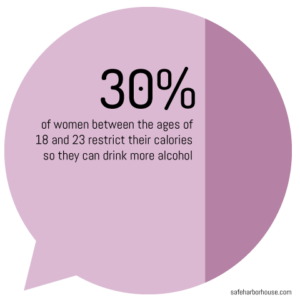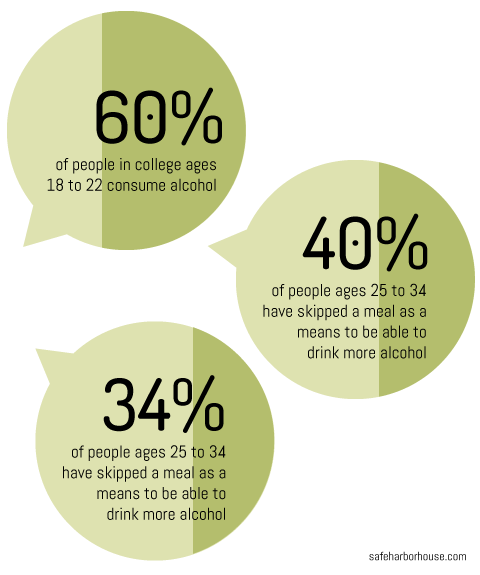Drunkorexia
Drunkorexia is a slang term for a person that avoids eating food or reduces the amount of food they eat so they can drink or drink more.1 Doctors consider this a risky behavior because it can lead to other harmful disorders, including binge drinking and anorexia, or restrictive eating. Some people may even purposefully engage in purging before or after drinking to avoid weight gain.
According to a research study detailed in ScienceDaily, some of the reasons a person may engage in this behavior include prevention of weight gain, being able to get drunk faster, or to save money to purchase more alcohol. Doctors may also call this condition “alcoholimia”.
Young Women
According to the University of Texas at Austin University Health Services, an estimated 30 percent of women between the ages of 18 and 23 restrict their calories so they can drink more alcohol.
Young Men
While doctors associate a greater proportion of women with experiencing drunkorexia, men are also at risk. Some men also report refraining from eating as a means to save money for drinking. Although there isn’t a lot of data or research about who is most likely to experience drunkorexia, young people are often mentioned as a common demographic.
College Age
While drunkorexia is not solely a college problem, it is a problem that can often begin in college.
According to The Washington Post, an estimated 60 percent of people in college ages 18 to 22 consume alcohol. Other studies have supported this. According to Fox News, a United Kingdom study found an estimated 40 percent of people ages 25 to 34 have skipped a meal as a means to be able to drink more alcohol. Another Italian study found an estimated 34 percent of people ages 18 to 24 have limited food in favor of drinking.
Young women who are college-aged are also more likely to experience higher rates of eating disorders, including anorexia and bulimia. Restrictive behaviors and attempts at weight control can be hallmarks of an eating disorder. While “drunkorexia” isn’t a scientifically recognized eating disorder, the two conditions can go hand in hand.
“Some students perceive drunkorexia to be harmless when in fact the behavior is extremely dangerous, Once they recognize that it’s unhealthy, a lot of students make the decision to change their behavior and get help as necessary.”
Tavis Glassman -Professor of Health Education and Public Health at the University of Toledo


Lack of food and higher levels of alcohol are not a healthy combination. There are several negative side effects to a person’s health from drunkorexia. Examples of some of the unwanted side effects include:
Alcohol Provides Little Nutritional Value
If a person skips meals in favor of alcohol, not only are they robbing their body of nutrients, they are also not feeding their body with key nutrients and energy. Also, a person may end up binge drinking at the end of the night because a person may get excessively hungry after skipping a meal or meals.
Impaired Judgement
Consuming too much alcohol can impair judgment and increase the risk of an accident, such as a fall. According to Healthline, an estimated 1,800 college students die each year from alcohol-related accidents.4 In addition to drinking’s deadly effects, an estimated 700,000 students are assaulted by another student who have been drinking.
Overworking the Liver
When a person’s body breaks down alcohol, the liver naturally uses more necessary nutrients. This can create vitamin deficiencies in a person’s body. Examples of these deficiencies include vitamin B, especially thiamine, magnesium, fiber, or protein. (3)
According to Victoria Osborne, an assistant professor of social work and public health interviewed in ScienceDaily, “Apart from each other, depriving the brain of adequate nutrition and consuming large amounts of alcohol can be dangerous. Together, they can cause short- and long-term cognitive problems including difficulty concentrating, studying, and making decisions.”
Women experience drunkorexia at a higher rate than men. They are also more likely to experience intoxication at faster rates than men. This can put them at greater risk for adverse side effects, including liver damage from excess drinking.
The concept and term “drunkorexia” is one that emerged in the early 2010’s. While experts on addiction as well as eating disorders were likely aware of the connection, they are starting to develop more information on the condition and who is at risk.
According to The Washington Post, researchers are trying to have the term “alcoholimia” added to the Diagnostic and Statistical Manual of Mental Disorders. This could be an important move forward for researchers because it would give doctors a definitive way to diagnose these behaviors and start collecting more information on why and how drunkorexia happens.
In addition, it would help those suffering from drunkorexia gain support for medical treatment.
Long-term excess alcohol consumption can adversely affect a person’s health, including increasing the risks for certain cancer types as well as affecting the immune system to make a person more vulnerable to a number of illnesses.
Binge drinking episodes can be as dangerous as long-term drinking, according to the National Institutes of Health. Alcohol can affect a number of body systems long-term. Examples of these include:
Heart
Alcohol abuse can cause a condition known as cardiomyopathy or enlargement. A too-large, over-stretched heart can affect its ability to pump well. People who abuse alcohol are also at greater risk for heart conditions such as high blood pressure, stroke, and irregular heart rhythms.
Liver
The liver is responsible for filtering and breaking down alcohol in the body. Therefore, when a person drinks to excess or drinks heavily on a regular basis, they are at risk for liver damage and scarring. Examples include liver cirrhosis, alcoholic hepatitis, and fatty liver. A person needs their liver to work well in order to enjoy good health. Without a well-functioning liver, a person’s life can be much shorter.
Immune System
Alcohol can cause inflammation and damage to the immune system that leads to increased risks for experiencing medical conditions such as pneumonia. This condition can be deadly to a person whose health is already compromised due to alcohol abuse.
The concept and term “drunkorexia” is one that emerged in the early 2010’s. While experts on addiction as well as eating disorders were likely aware of the connection, they are starting to develop more information on the condition and who is at risk.
According to The Washington Post, researchers are trying to have the term “alcoholimia” added to the Diagnostic and Statistical Manual of Mental Disorders. This could be an important move forward for researchers because it would give doctors a definitive way to diagnose these behaviors and start collecting more information on why and how drunkorexia happens.
In addition, it would help those suffering from drunkorexia gain support for medical treatment.
https://healthyhorns.utexas.edu/drunkorexia.html
https://www.sciencedaily.com/releases/2011/10/111017171506.htm
https://www.washingtonpost.com/lifestyle/wellness/new-concern-on-college-campuses-drunkorexia-a-combination-drinking-and-eating-disorder/2019/03/08/093cf47c-4028-11e9-9361-301ffb5bd5e6_story.html?utm_term=.b74ebca0b83c
https://www.healthline.com/health-news/concerns-grow-over-drunkorexia
https://www.foxnews.com/health/dangers-of-drunkorexia-what-happens-when-you-skip-meals-to-drink-alcohol
https://www.niaaa.nih.gov/alcohol-health/alcohols-effects-body

The Safe Harbor House Admissions Team works to ensure that we can help as many people struggling with substance abuse. Verify your benefits now and we’ll get back to you right away.
Receive the highest level of care available at Safe Harbor. We are here to answer your call or fill out our confidential contact form to get started.



